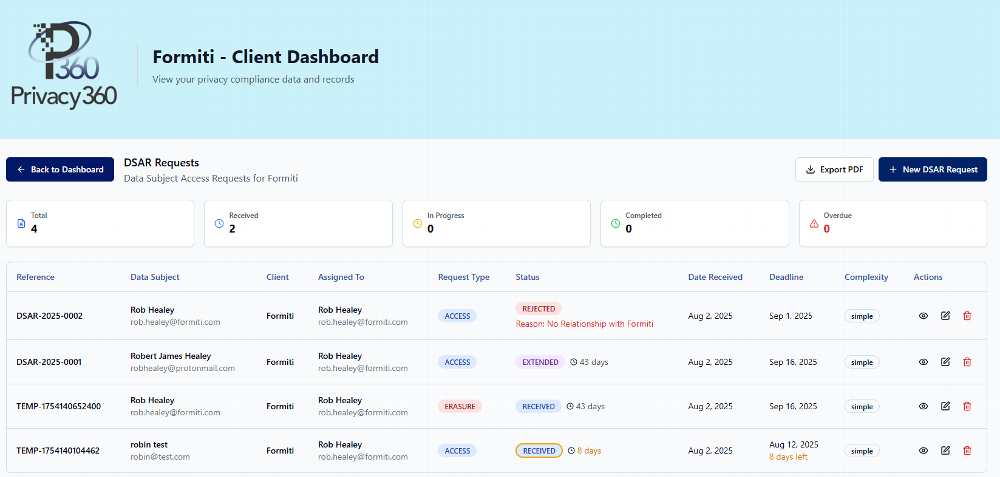In today's interconnected world, businesses operate across borders, and so do their customers and employees. This global presence brings a host of opportunities—and a complex web of data privacy challenges. One of the most significant is managing Subject Access Requests (SARs), also known as Data Subject Access Requests (DSARs).
For organisations with a multi-country footprint, a single SAR can trigger a domino effect of legal and administrative complexities. The central challenge isn't just responding to the request, but doing so within the correct legal timeframe, which can vary dramatically from one country to another.
The Labyrinth of Country-Specific Deadlines
Imagine receiving a SAR from an employee in Germany, a customer in California, and a former client in Brazil. Each of these requests is governed by a different set of laws:
GDPR (Europe): Mandates a response within one calendar month.
CCPA/CPRA (California): Requires a response within 45 days, with a possible 45-day extension.
LGPD (Brazil): Gives organizations up to 15 days to respond.
This is a simplified view. The reality is that the legal landscape is fragmented and constantly evolving, with new regulations emerging and existing ones being updated. Manually tracking these deadlines, and the specific rules that accompany them, is not just inefficient—it's a recipe for compliance failure.
The Manual Process: A Compliance Nightmare
Without a centralised, automated system, the manual process for handling global SARs looks something like this:
Request Arrival: A SAR arrives via email, a web form, or a physical letter.
Initial Triage: An HR or compliance team member identifies the data subject's location and attempts to determine the applicable law.
Manual Research: The team member must then research the specific deadline for that country and any unique requirements, such as what constitutes a valid request or how to deliver the response.
Calendar Management: A reminder is set in a spreadsheet or personal calendar, which is prone to human error, oversight, or being lost in a cluttered workflow.
Data Collection & Review: The team scrambles to collect the data, with the clock ticking.
Response Generation: The response is compiled and sent, hoping it meets all the legal requirements before the deadline.
This workflow is slow, resource-intensive, and carries a high risk of mistakes that can lead to fines, reputational damage, and a loss of customer trust. For HR departments, which often manage requests from current and former employees across the globe, this is an especially significant burden.
A Modern Solution for a Global Problem
The answer to this challenge isn't more spreadsheets and calendars—it's intelligent automation. Organizations need a platform that can handle the complexity of global data privacy laws in real-time, allowing teams to focus on fulfilling the request, not managing the deadlines.
This is where the Privacy360.io DSAR module comes in. Our platform is specifically designed to solve this global problem. Upon receiving a request, it automatically detects the country of origin of the data subject. From there, it applies the correct local privacy law and assigns the precise deadline by which the request must be completed. This seamless process eliminates the risk of human error and ensures that your organization remains compliant, no matter where your data subjects are located.
Our DSAR module is an essential tool for HR departments and compliance professionals working in a multi-country environment. It simplifies the complex, reduces administrative overhead, and gives you the peace of mind that comes with knowing your deadlines are being managed automatically.
Ready to take control of your global SAR process? Schedule a demo of the Privacy360.io DSAR module today to see how we can transform your compliance workflow. https://privacy360.io
